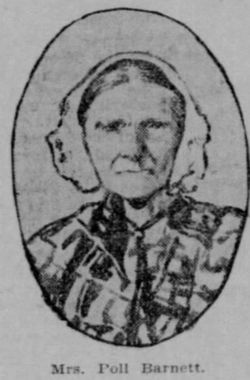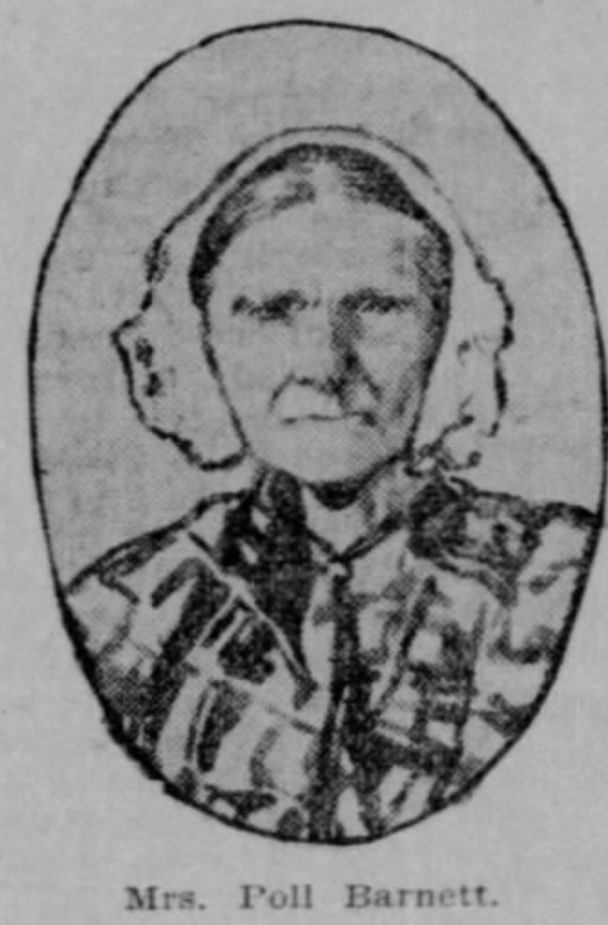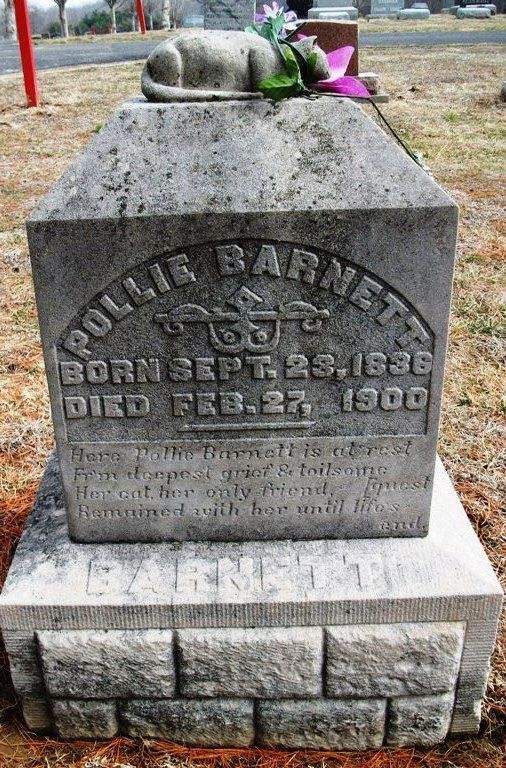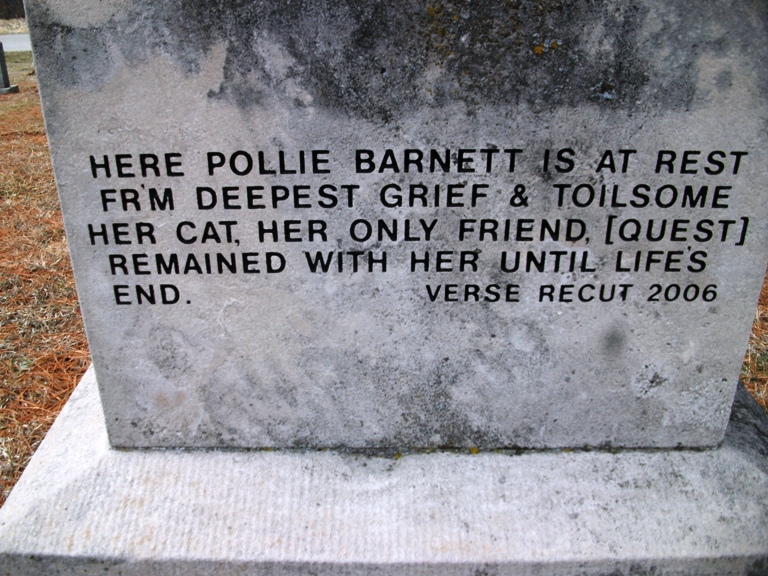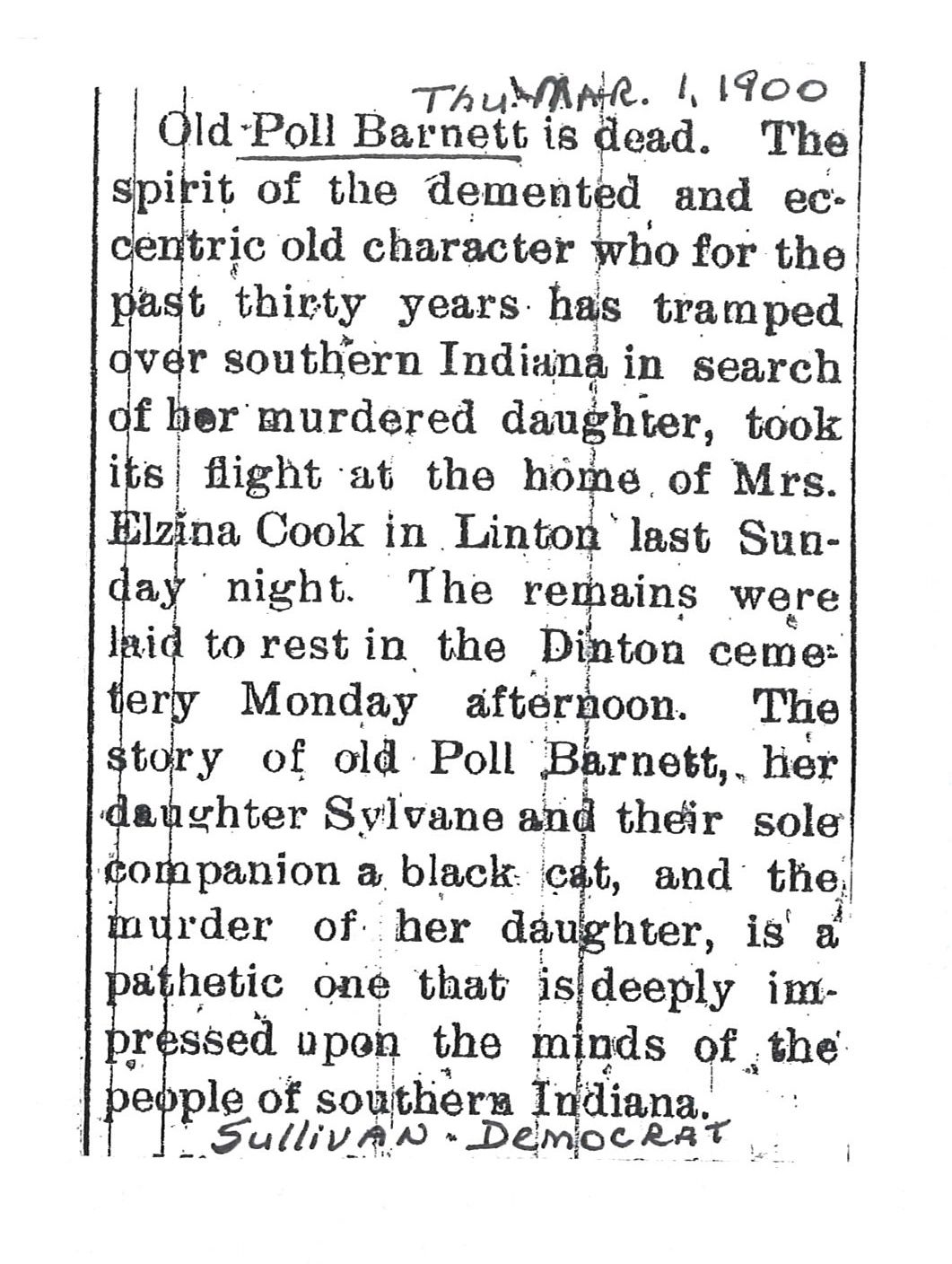Pollie Barnett was born near Solsberry, Indiana, on September 23, 1836. She married John Sexton, and three years later they had a daughter. They named their daughter Sylvia. She had large blue eyes and beautiful blonde hair. When Sylvia turned fourteen, her father passed away. Two months later Sylvia disappeared. It was then that Pollie dropped her last name of Sexton and took back her maiden name of Barnett.
Pollie was determined to find her daughter. She searched the hills, fields, and hollers for Sylvia. Pollie took along with her very few things. One of the items she selected was her black cat. They roamed all over Brown County for one month. She returned home tired, hungry, and thin.
A few months later she decided to start looking again. With a pack on her back along with her cat, she searched the fields and hollers in Jackson County from October to May. During the time she was gone, she ate berries and nuts and lived in the wild. When she returned in May of that year, she started a garden. From her garden she canned food. She shot wild game such as deer, squirrels, rabbits, and made sausage. She worked for ten years at a general store near Bloomington.
One day she told her brother-in-law she was leaving in search of Sylvia again. This time she would search Johnson, Morgan, Montgomery, Owen, and Greene Counties. With the little money she had hidden in her sack or shoe, she left once again. To earn money along the way, she picked fruits and berries and sold them to the townspeople as she went through the towns.
Pollie died on February 27, 1900. She never located her missing daughter. The inscription on her stone is as follows:
Here Pollie Barnett is at rest,
From deepest grief and toilsome quest,
Her cat, her only friend,
Remained with her until life's end.
"This is another story."
As a lad of 12 when Polly died, local resident Ferdinand Bolton had many memories and had heard numerous stories about Polly. Before his death, he passed the information to his daughter, Bedonna Scott. It is common knowledge that for half of her life Polly wandered the countryside looking for her lost daughter. But Polly had not always been a dirty, old and demented woman. She had once been a normal person with a happy childhood.
Scott said when Polly was 16 years old; she met Jim Hart, a young man who was a trapper and hunter from the river bottoms. The young couple soon were married and bought a small tract of land near Worthington. Polly and Jim built a small cabin and grew fruit and vegetables. With their crops and what he earned from selling furs, Jim provided a good living. Two years after the marriage, the two were blessed with a child, a beautiful, blue-eyed, blonde haired daughter, Angeline. Three years later they had a second daughter, Sylvania. It was during that time that the Civil War was raging, and Jim felt obligated to serve his country.
For the next three years, Polly helped maintain the gardens, while waiting for Jim's safe return. Jim finally returned home in March of 1865. However, he had grown ill from a wound he had received in battle, and Polly's energy and loving care were not enough for Jim to overcome his sickness. He died April 15, 1865, the same day as President Abe Lincoln's death.
Polly continued to work on the farm with the help of a hired hand, Henry Barnett, whom she later married. Once again, Polly had a complete family. She watched the girls grow, but favored Angeline because she looked so much like her father.
Scott said there were various stories as to how Angeline died, but a popular version that Bolton had heard was that Polly allowed Angeline to stay with a nice farm family who attended her church. Monday through Friday, Angeline would help the family after school, and on Friday afternoon, she would go home. On Sunday afternoon, she would return to the farm.
One Sunday, Angeline did not return to the farm. The family assumed she was ill. However the next Sunday, when Polly went to church, she asked about Angeline. The family said they assumed she was ill, and that was why she hadn't returned the previous week. Unable to accept that her daughter was gone, Polly went to look for her. When she returned home, she found her husband very sick. Due to Henry's failing health, Polly had to pause in her quest for Angeline. Within days, Henry died, and it was another heartbreak for Polly.
Once again, Polly began her search for Angeline. After combing the countryside, Polly returned home to find her house had burned to the ground. The only possessions she had were the clothes on her back. It was then that she found a little black cat that became her friend. Polly soon began to hallucinate about her daughter, and nothing else seemed to matter. The dirt and filth began to accumulate on her ragged clothing. She would tie the cat to her at night with the rope she wore around her waist. She slept in old barns, schoolhouses and churches and ate berries and fruit that she found along the way. Many times local people found her sleeping on their front porch, and they would give her food. One of the places that Polly liked to stay was at the Bolton farm.
When Bolton's mother or one of the children would find her on the porch, Mrs. Bolton would ask Polly if she were hungry, and Barnett would reply, "No, but my cat is." Polly would then share her food with the cat.
It is thought Polly visited thousands of families and many schoolhouses in a six-county area during her quest.
One morning in 1900, Elaine Cook of Linton found Polly on her front porch. Cook took her in and cleaned her up. However, in just a few days, Polly died of unknown causes. Found folded in Polly's apron pocket was a baby's bonnet.
Barnett had a pauper funeral at the old Clayton Funeral Home, which is now Anderson Poindexter. After the funeral, a shoebox was placed in the funeral home to hold donations to be used toward purchasing a monument for Polly.
Henry Strietelmier made the monument, and this is the inscription: "Here Polly Barnett is at rest, From deepest grief and toilsome quest, Her cat her only friend, Remained with her until life's end."
Polly never found her daughter, but many years later, on his deathbed, a man spoke of a time when he and two other boys had wanted to have some fun. They decided to hide in the bushes and jump out at Angeline. When they did, she was so startled she started to run and fell on a rock. The boys dragged her body into the bushes and left her. Later they returned, expecting her to be gone. However, she was still there, and they realized she was dead. They carried her body to the riverbank and buried her in the sand. Bones, thought to Angeline's, were found at the described location, which was near the river in Newberry.
~~~~~~~~~~~~~~~
"Long Search by a Mother - 'Aunt Polly' Barnett dead, after seeking a lost daughter twenty years. Times-Picayune, New Orleans, April 1, 1900, Page 15. This article indicates her maiden name was Lay and she was born in Kentucky. It also states she was first married to a man named Sexton and after his death she married a man named Barnett. She had one child with Sexton and it was this girl's disappearance that made her an insane wanderer. This article also quotes the story of the disappearance by the prosecuting attorney of Green county. They suspected three men who all later met with a tragic death. Polly was accompanied by her younger daughter (child of Barnett) on her walks throughout southern Indiana. 'The daughter who accompanied her, always walking just behind her, grew into womanhood. A few years ago this daughter died of consumption.' Polly died in Linton and her cat left Linton a few days previous to this news article. (From the news article April 1 - she wanted her cat to continue looking for her daughter...)
Contributed by GraveTrotter
∼Linton, IN newspaper – February 6, 1947 (in part)
Strange People of Years Ago
".....The writer recalls that the late J. M. Humphreys, for many years a local funeral director, was a prime mover in this last tribute to Aunt Polly and contributed the cost of burial, while another fine old resident of this city, Mrs. Elaina Cook, who lived for many years at 390 "D" street Northwest, took the poor old woman in and cared for her in her last illness, all without thought of any material recompense, but reward enough to her was the knowledge that she had done a kindly act --- and she did many.
The text under the picture of the monument that appeared in the clipping handed to us to read: "Subjected to jeers and laughter from unsympathetic men and women, the target for stones and other missiles thrown by village urchins – and then in death – honored by men who erected a marble statue sacred to her memory, in the Fairview cemetery here – that was the strange fate of Polly Barnett......"
Pollie Barnett was born near Solsberry, Indiana, on September 23, 1836. She married John Sexton, and three years later they had a daughter. They named their daughter Sylvia. She had large blue eyes and beautiful blonde hair. When Sylvia turned fourteen, her father passed away. Two months later Sylvia disappeared. It was then that Pollie dropped her last name of Sexton and took back her maiden name of Barnett.
Pollie was determined to find her daughter. She searched the hills, fields, and hollers for Sylvia. Pollie took along with her very few things. One of the items she selected was her black cat. They roamed all over Brown County for one month. She returned home tired, hungry, and thin.
A few months later she decided to start looking again. With a pack on her back along with her cat, she searched the fields and hollers in Jackson County from October to May. During the time she was gone, she ate berries and nuts and lived in the wild. When she returned in May of that year, she started a garden. From her garden she canned food. She shot wild game such as deer, squirrels, rabbits, and made sausage. She worked for ten years at a general store near Bloomington.
One day she told her brother-in-law she was leaving in search of Sylvia again. This time she would search Johnson, Morgan, Montgomery, Owen, and Greene Counties. With the little money she had hidden in her sack or shoe, she left once again. To earn money along the way, she picked fruits and berries and sold them to the townspeople as she went through the towns.
Pollie died on February 27, 1900. She never located her missing daughter. The inscription on her stone is as follows:
Here Pollie Barnett is at rest,
From deepest grief and toilsome quest,
Her cat, her only friend,
Remained with her until life's end.
"This is another story."
As a lad of 12 when Polly died, local resident Ferdinand Bolton had many memories and had heard numerous stories about Polly. Before his death, he passed the information to his daughter, Bedonna Scott. It is common knowledge that for half of her life Polly wandered the countryside looking for her lost daughter. But Polly had not always been a dirty, old and demented woman. She had once been a normal person with a happy childhood.
Scott said when Polly was 16 years old; she met Jim Hart, a young man who was a trapper and hunter from the river bottoms. The young couple soon were married and bought a small tract of land near Worthington. Polly and Jim built a small cabin and grew fruit and vegetables. With their crops and what he earned from selling furs, Jim provided a good living. Two years after the marriage, the two were blessed with a child, a beautiful, blue-eyed, blonde haired daughter, Angeline. Three years later they had a second daughter, Sylvania. It was during that time that the Civil War was raging, and Jim felt obligated to serve his country.
For the next three years, Polly helped maintain the gardens, while waiting for Jim's safe return. Jim finally returned home in March of 1865. However, he had grown ill from a wound he had received in battle, and Polly's energy and loving care were not enough for Jim to overcome his sickness. He died April 15, 1865, the same day as President Abe Lincoln's death.
Polly continued to work on the farm with the help of a hired hand, Henry Barnett, whom she later married. Once again, Polly had a complete family. She watched the girls grow, but favored Angeline because she looked so much like her father.
Scott said there were various stories as to how Angeline died, but a popular version that Bolton had heard was that Polly allowed Angeline to stay with a nice farm family who attended her church. Monday through Friday, Angeline would help the family after school, and on Friday afternoon, she would go home. On Sunday afternoon, she would return to the farm.
One Sunday, Angeline did not return to the farm. The family assumed she was ill. However the next Sunday, when Polly went to church, she asked about Angeline. The family said they assumed she was ill, and that was why she hadn't returned the previous week. Unable to accept that her daughter was gone, Polly went to look for her. When she returned home, she found her husband very sick. Due to Henry's failing health, Polly had to pause in her quest for Angeline. Within days, Henry died, and it was another heartbreak for Polly.
Once again, Polly began her search for Angeline. After combing the countryside, Polly returned home to find her house had burned to the ground. The only possessions she had were the clothes on her back. It was then that she found a little black cat that became her friend. Polly soon began to hallucinate about her daughter, and nothing else seemed to matter. The dirt and filth began to accumulate on her ragged clothing. She would tie the cat to her at night with the rope she wore around her waist. She slept in old barns, schoolhouses and churches and ate berries and fruit that she found along the way. Many times local people found her sleeping on their front porch, and they would give her food. One of the places that Polly liked to stay was at the Bolton farm.
When Bolton's mother or one of the children would find her on the porch, Mrs. Bolton would ask Polly if she were hungry, and Barnett would reply, "No, but my cat is." Polly would then share her food with the cat.
It is thought Polly visited thousands of families and many schoolhouses in a six-county area during her quest.
One morning in 1900, Elaine Cook of Linton found Polly on her front porch. Cook took her in and cleaned her up. However, in just a few days, Polly died of unknown causes. Found folded in Polly's apron pocket was a baby's bonnet.
Barnett had a pauper funeral at the old Clayton Funeral Home, which is now Anderson Poindexter. After the funeral, a shoebox was placed in the funeral home to hold donations to be used toward purchasing a monument for Polly.
Henry Strietelmier made the monument, and this is the inscription: "Here Polly Barnett is at rest, From deepest grief and toilsome quest, Her cat her only friend, Remained with her until life's end."
Polly never found her daughter, but many years later, on his deathbed, a man spoke of a time when he and two other boys had wanted to have some fun. They decided to hide in the bushes and jump out at Angeline. When they did, she was so startled she started to run and fell on a rock. The boys dragged her body into the bushes and left her. Later they returned, expecting her to be gone. However, she was still there, and they realized she was dead. They carried her body to the riverbank and buried her in the sand. Bones, thought to Angeline's, were found at the described location, which was near the river in Newberry.
~~~~~~~~~~~~~~~
"Long Search by a Mother - 'Aunt Polly' Barnett dead, after seeking a lost daughter twenty years. Times-Picayune, New Orleans, April 1, 1900, Page 15. This article indicates her maiden name was Lay and she was born in Kentucky. It also states she was first married to a man named Sexton and after his death she married a man named Barnett. She had one child with Sexton and it was this girl's disappearance that made her an insane wanderer. This article also quotes the story of the disappearance by the prosecuting attorney of Green county. They suspected three men who all later met with a tragic death. Polly was accompanied by her younger daughter (child of Barnett) on her walks throughout southern Indiana. 'The daughter who accompanied her, always walking just behind her, grew into womanhood. A few years ago this daughter died of consumption.' Polly died in Linton and her cat left Linton a few days previous to this news article. (From the news article April 1 - she wanted her cat to continue looking for her daughter...)
Contributed by GraveTrotter
∼Linton, IN newspaper – February 6, 1947 (in part)
Strange People of Years Ago
".....The writer recalls that the late J. M. Humphreys, for many years a local funeral director, was a prime mover in this last tribute to Aunt Polly and contributed the cost of burial, while another fine old resident of this city, Mrs. Elaina Cook, who lived for many years at 390 "D" street Northwest, took the poor old woman in and cared for her in her last illness, all without thought of any material recompense, but reward enough to her was the knowledge that she had done a kindly act --- and she did many.
The text under the picture of the monument that appeared in the clipping handed to us to read: "Subjected to jeers and laughter from unsympathetic men and women, the target for stones and other missiles thrown by village urchins – and then in death – honored by men who erected a marble statue sacred to her memory, in the Fairview cemetery here – that was the strange fate of Polly Barnett......"
